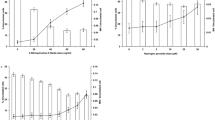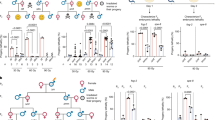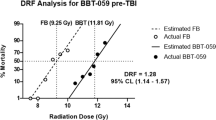Abstract
We have investigated the possibility that transgenerational effects from preconceptional paternal irradiation (PPI) may render offspring more vulnerable to secondary exposure to an unrelated carcinogen. 239Pu (0, 128 or 256 Bq g(-1)) was administered by intravenous injection to male mice, 12 weeks before mating with normal females. Two strains of mouse were used -- CBA/H and BDF1. Haemopoietic spleen colony-forming units (CFU-S) and fibroblastoid colony-forming units (CFU-F), a component of their regulatory microenvironment, were assayed independently in individual offspring at 6, 12 and 19 weeks of age. Bone marrow and spleen from each of these mice were grown in suspension culture for 2 or 7 days for assessment of chromosomal aberrations. Female BDF1 were injected with methyl-nitroso-urea (MNU) as a secondary carcinogen at 10 weeks of age and monitored for onset of leukaemia/lymphoma. Mean values of CFU-S and CFU-F were unaffected by preconceptional paternal plutonium-239 (PP-239Pu), although for CFU-F in particular there was an apparent increase in variation between individual animals. There was significant evidence of an increase in chromosomal aberrations with dose in bone marrow but not in spleen. By 250 days, 68% of MNU-treated control animals (no PPI) had developed thymic lymphoma (62%) or leukaemia (38%). The first case arose 89 days after MNU administration. In the groups with PPI, leukaemia/lymphoma developed from 28 days earlier, rising to 90% by 250 days. Leukaemia (65%) now predominated over lymphoma (35%). This second generation excess of leukaemia appears to be the result of PPI and may be related to inherited changes that affect the development of haemopoietic stem cells.
This is a preview of subscription content, access via your institution
Access options
Subscribe to this journal
Receive 24 print issues and online access
$259.00 per year
only $10.79 per issue
Buy this article
- Purchase on Springer Link
- Instant access to full article PDF
Prices may be subject to local taxes which are calculated during checkout
Similar content being viewed by others
Author information
Authors and Affiliations
Rights and permissions
About this article
Cite this article
Lord, B., Woolford, L., Wang, L. et al. Tumour induction by methyl-nitroso-urea following preconceptional paternal contamination with plutonium-239. Br J Cancer 78, 301–311 (1998). https://doi.org/10.1038/bjc.1998.491
Issue Date:
DOI: https://doi.org/10.1038/bjc.1998.491
This article is cited by
-
Radiation-induced bystander effects in the Atlantic salmon (salmo salar L.) following mixed exposure to copper and aluminum combined with low-dose gamma radiation
Radiation and Environmental Biophysics (2014)



